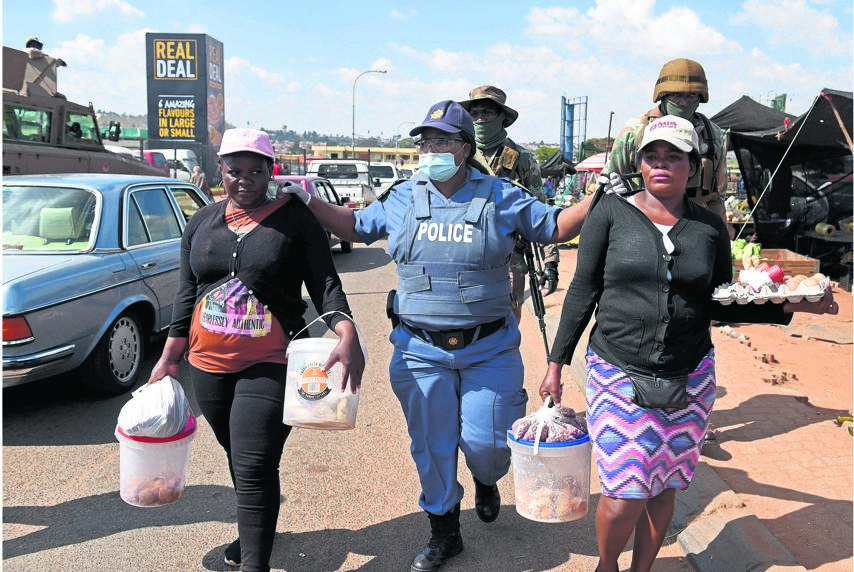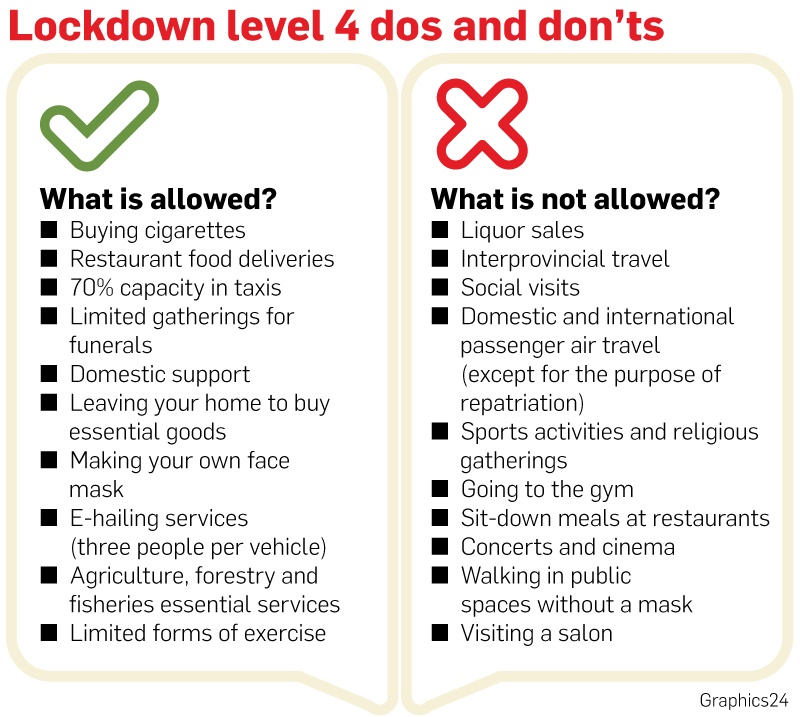
The restrictions related to the Covid-19 coronavirus pandemic would only be eased further if the levels of transmission were lowered and the health system was more prepared. This means more available beds and fewer people being admitted for treatment.
Government ministers yesterday said compliance with the state’s health and safety regulations would determine whether the efforts to gradually open up economic activity and ease the country back to normal life would succeed.
Some of the activities that would be allowed from Friday include exercising, under strict conditions that include not going to gyms, which remain closed, and not in groups. People would also be allowed to order cooked food, but would not be allowed to sit in restaurants or go to collect takeaways.
The manufacture and sale of winter clothing, and bedding and linen, will be allowed. But the sale of alcohol is still prohibited.
Industries and the public got a warning that “strict adherence to public health instructions” was non-negotiable, including that everyone leaving their home for work should wear a mandatory face mask covering the nose and mouth from Friday.
Transport services are expected to adhere to health protocols like the mandatory sanitisation of vehicles during and after trips.
READ: Ramaphosa levels with SA on plans to reopen the economy
As of midnight on Thursday, the country enters level 4 of lockdown from level 5, which is measured by high virus spread and/or low health system readiness. Government plans to turn the conditions around to a situation where virus transmission is low and the health system is close to optimal preparedness.
Trade and Industry Minister Ebrahim Patel said government’s risk-adjustment approach comprised three elements, including risk level assessment, an industrial classification system, as well as comprehensive public health and social distancing measures.
In terms of determining the industrial classification, Patel said government analysed four factors: the risk of transmission, spread of infections and the number of people travelling to work; the expected impact of the lockdown on the sector; the contribution to the economy and linkages to other sectors; and the promotion of economic wellbeing.
He said the classification was a difficult balancing act that had to take into consideration the need to open up the economy again, as well as the need to contain the spread of the virus and save lives.
“We have to work hard to bring the risk levels down for more economic activities to open,” Patel said.
He said the resumption of limited economic activity would also boost government’s test drive, as workplaces would be expected to feed their statistics to the National Institute for Communicable Diseases.
“The virus will be with us for the next six to eight months, so workplaces have to be ready.”
He said the focus was on restarting the core parts of the economy: “If we move too fast, we risk a rapid rise of the infection and going back to level 5. That would be detrimental to the economy.” But he warned that moving too slowly was equally undesirable.
The agriculture, forestry and mining sectors are the industries that will have increased activity as the country moves to level 4.
“We estimate that it will enable 1.5 million South Africans to go back to work, which is more than four out of 10 people,” said Patel.
He said the manufacturing industry would be opening to a 20% capacity, which would enable the manufacturing of children’s winter clothing, blankets, computers and cellphones, cars, cement, hardware and stationery.
Additional retailers would be allowed to operate, including informal traders and spaza shops, while informal recyclers would be able to make a living again as the industry started operating.
Construction work would be expanded to deal with projects that are not only essential, which meant that civil engineers would be going back to work, Patel said.
He said restaurants were allowed to deliver food to consumers, which would be a good opportunity for township businesses to start delivery services. He encouraged South Africans to buy locally made goods to help to bolster the economy.
But if infection numbers shot up, more restrictive measures would have to be applied, Cooperative Governance and Traditional Affairs Minister Nkosazana Dlamini-Zuma said yesterday: “Stick to what you are supposed to do. It is your choice.”
She said that “industry must stick to guidelines as short cuts to save money would prove costly when operations have to shut down because of infections”.
She made it clear that the lockdown would continue beyond April 30 and that moving to a lower level was only a mechanism to reboot South Africa’s economy.
Government had looked into the types of industries that posed the lowest risk and contributed the most to the economy as those that would operate under level 4. Another criteria was measuring whether the said industries contributed towards the promotion of community wellbeing, which specifically looked at the livelihood of the most vulnerable citizens.
She reiterated, however, that government would not hesitate to move back to stricter level 5 if regulations were not followed and the pandemic started peaking. This means that South Africans will have to take extra precautions to curb the spread of the Covid-19 coronavirus.
Every citizen was expected to cover their nose and mouth when they were in public. Bearing in mind the shortage of surgical masks, Dlamini-Zuma recommended that citizens use cloth masks or scarves, or resort to making their own masks.
Industries that are allowed to return to work are expected to have strict daily health checks. This entails checking employees’ temperatures and ensuring they do not have any symptoms of the virus.
Dlamini-Zuma recommended that big companies take it a step further by testing employees to eliminate the instance where those whose symptoms were dormant would infect their fellow employees.
Wits vaccinology Professor Shabir Madhi has told City Press that what would be key going forward was not focusing on the total number of infection cases that were increasing, but on how prepared healthcare facilities were to receive patients.
And that should determine how the country, provinces and districts move up or down the five lockdown levels as announced by President Cyril Ramaphosa on Thursday night.
On Friday night, Health Minister Zweli Mkhize said that there had been an increase of 8 820 tests done in both the private and public sectors, bringing the total number of tests conducted to 152 390. There were also 267 new Covid-19 cases, with the total of confirmed cases standing at 4 220.
“We need to be careful how we interpret the number of cases because it is sensitive to the numbers of people tested. In the first two weeks of lockdown, we were testing fewer than 1 000 people a day. Then on Thursday, we were testing just over 6 000 people a day. And now we are reporting between 150 and 250 positive cases a day. If you test five times more, you’re going to pick up five times the number of cases, obviously. We’re looking to test at least 15 000 a day, and should be targeting 30 000, so we will be seeing more cases,” Madhi explained.
The problem currently, he added, was that there was a difference in the amount of testing being done in provinces. While the Western Cape appeared to be leading in terms of cases of patients with the virus, it didn’t mean it was the new “hot spot”. All it meant was that the province was testing more people – something every province should be doing.
“Whatever we do, we won’t be able to change a lot in terms of how this virus evolves over a period of time. But what we can try to control is making sure our health facilities are adequately equipped to handle cases. Basically, the most important measure on whether we go up or down the lockdown levels relates to the occupancy rate in hospitals allocated to treat Covid-19. We’re probably using 10% of our capacity in terms of beds used to treat Covid-19 and that’s probably because of the lockdown. In my opinion, it’s not about the total number of cases reported, but how our healthcare services are coping at any given point in time. Then we can project from there what demand will be for two to three weeks,” he said.
Madhi added that the lockdown, which had been in effect for five weeks, had to an extent helped to free up the numbers of beds available in hospitals as many institutions had cancelled elective surgeries and made contingency measures.




 Publications
Publications
 Partners
Partners










